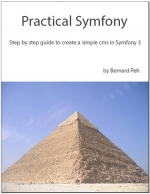Practical Symfony. B. Peh

Категория: PHP
Поделиться:
Building an application is like building a Pyramid. You create each piece of functionality bit by bit. You test the functionality and make sure its stable before building the next piece. This cycle continues until you reach the peak - completion.Choosing the best framework for RAD (Rapid Application Development) has been a topic debated to death. Today, there is no longer such a thing as “The Best Framework” because all modern day frameworks follow the best practice. However, there is such a thing called “The Best Practice”. In fact, you can see similar development methodologies being used across all frameworks. So knowing one framework well means you can jump between other frameworks easily. Just as human evolves, different frameworks learn from each other and adapt very fast to new and better technologies.At the time of writing, NodeJS continues to innovate with PHP closing in fast behind. PHP is the old veteran when comes to web development with the most frameworks in the market. The 2 frameworks that stood out from the pack were Laravel and Symfony. If you are looking to learn a new framework, I highly recommend Symfony because it is one of the more stable modern framework out there. Symfony components have been widely used by many popular projects including Composer, Behat, Codeception, Drupal and Laravel (just to name a few).Learning Symfony is never an easy task. Many people follow tutorials in google, read up all the documentation in Symfony website and still find it challenging to create a simple application. Why? Because there is too much theory and not enough real world practical examples. Worst still, you can get entangled in technical jargons and advance customisations easily. The fact that Symfony is an extremely flexible framework makes it even harder to master because there are so many ways to achieve the same goal. If you are new to MVC (Model-View-Controller) and RAD, you will find that Symfony has a steep learning curve.This book aims to lower the learning curve by providing a step by step hands-on approach to guide developers who are new to Symfony to build a simple CMS using good industry practice. Let us call the CMS “SongBird”. Hopefully after following all the chapters, your eyes will be opened to RAD and the unlimited possibilities with Symfony
Скачать
Комментарии